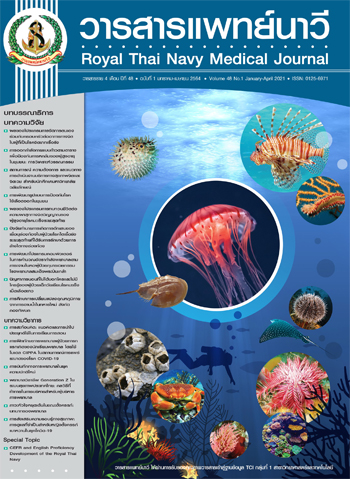The Effect of Life Review Program on Spiritual Well-being of Older Persons with End Stage Cancer
Main Article Content
Abstract
This quasi-experimental study with pretest-posttest control group design aimed to examine the effects of life review program on spiritual well-being of older person with end stage cancer. The sample was purposive sampling on 40 older persons with end stage cancer. They were matched pair with age, gender, marital status, severity of disease, and spiritual well-being level. Twenty of them were assigned into control group and received conventional care, and 20 participants were in the experimental group and received the life review intervention developed by Ando based on the Butler's concept Life Review. Data were collected using the personal data record form, the Mini-Mental State Examination-Thai version (MMSE-Thai), the Spiritual Needs questionnaire, and The Geriatric Spiritual Well Being Scale (GSWS-Thai). The GSWS-Thai had a content validity of 0.88 and a reliability of 0.85. Data were analyzed using descriptive and T-test statistics.
The major findings were as follows: The spiritual well-being in the experimental group after receiving the life review program had statistically significantly higher than before receiving the intervention (p < .001). The spiritual well-being in experimental group also had statistically significantly higher than the control group (p < .001).
The results of this research showed that the review of life It can help to improve the spiritual well-being of elderly people suffering from terminal cancer. In this way, the review of life is used in spiritual care. Nurses should have the skills of counseling. Regular skill training plays a more proactive role in spiritual care among elderly patients receiving palliative nursing.
Article Details

This work is licensed under a Creative Commons Attribution-NonCommercial-NoDerivatives 4.0 International License.
References
2. Department of Medical Services, Ministry of Public Health. National cancer control program (2018-2020). [Internet]. [cited 2019 June 20]. Available from: http://www.nci.go.th/th/File_download/D_index/.pdf. (in Thai).
3. Cancer Research UK. Cancer incidence. [Internet]. [cited 2019 September 12]. Available from: https://www.cancerresearchuk.org/health-professional/cancer-statistics-for-the-uk.
4. Greenlee RT, Murray T, Bolden S, Wingo PA. Cancer statistics, 2000. Cancer Journal for Clinicians 2000;50(1):7-33.
5. Mahon S, Casperson D. Psychosocial concerns associated with recurrent cancer. Cancer Practice 1995;3(6):372-80.
6. National Cancer Institute. Hospital cancer registration 2015, Bangkok: Pornsap Printing; 2017. (in Thai).
7. Keck VE, Walther LS. Nurse encounters with dying and non-dying patients. Nursing Research 1977;26(6):465-9.
8. Jitaphan S. Deterioration is inevitable but can be slow. Bangkok: Faculty of Medicine, Chulalongkorn University; 2008. (in Thai).
9. Jocham HR, Dassen T, Widdershoven G, Halfens RJ. Quality-of-life assessment in a palliative care setting in Germany: an outcome evaluation. International Journal of Palliative Nursing 2009;15(7):338-45.
10. Thongprathip T. Spiritual: one dimension of nursing. Bangkok: We Print; 2009. (in Thai).
11. Kübler-Ross E, Kessler D. On grief and grieving: finding the meaning of grief through the five stages of loss. New York: Simon and Schuster; 2005.
12. O'Brien ME. Spiritual in nursing: standing on holy ground. Massachusetts: Jones and Bartlett; 2008.
13. Suwanampa T, Ketpichayawattana J. The effect of nursing program using the Buddhist meritorious action 3 on the spiritual well - being of cancer patients. [Master's Thesis, Faculty of Nursing]. Chulalongkorn University; 2014. (in Thai).
14. Fang F, Fall K, Mittleman MA, Sparén P, Ye W, Adami HO, et al. Suicide and cardiovascular death after a cancer diagnosis. N Engl J Med 2012;366(14):1310-8.
15. Kidsamrong W, Soivong P, Vuttanon N. Effect of promoting life review on self-esteem among cancer patients receiving palliative care. Royal Thai Navy Medical Journal 2020;47(1):108-23. (in Thai).
16. Ando M, Morita T, Akechi T, Okamoto T. Efficacy of short-term life-review interviews on the spiritual well-being of terminally Ill cancer patients. Journal of Pain and Symptom Management 2010;39(6):993-1002.
17. Butler RN. The life review: an interpretation of reminiscence in the aged. Psychiatry 1963;26(1):65-76.
18. Ratsiri T. Nursing research: concepts to application. 3rd ed. Bangkok: Chaulalongkorn University Printing House; 2018. (in Thai).
19. Burns N, Grove SK. Understanding nursing research-eBook: building an evidence-based practice: Elsevier Health Sciences; 2010.
20. Wisetrit W, Soonthornchaiya R, Suksukcharoen P, Development and testing of an assessment tool for spiritual care needs for terminal patients in the context of Thai culture. Journal of Boromarajonani College of Nursing, Bangkok 2019;35(1):163-74. (in Thai).
21. Dunn KS. Development and psychometric testing of a new geriatric spiritual well-being scale. International Journal of Older People Nursing 2008;3(3):161-9.
22. Chewaskulyong B, Sapinun L, Downing GM, Intaratat P, Lesperance M, Leautrakul S, et al. Reliability and validity of the Thai translation (Thai PPS adult Suandok) of the Palliative Performance Scale (PPSv2). Palliative Medicine 2011;26(8):1034-41.
23. Lundman B, Viglund K, Aléx L, Jonsén E, Norberg A, Fischer RS, et al. Development and psychometric properties of the Inner Strength Scale. International Journal of Nursing Studies 2011;48(10):1266-74.
24. Ubonyam D. Watcharasin J. A structural model of inner strength of spousal caregivers among patients with advanced cancer. Journal of Boromarajonani College of Nursing, Bangkok 2018;34(2):86-100. (in Thai).
25. Ando M, Tsuda A, Morita T. Life review interviews on the spiritual well-being of terminally ill cancer patients. Supportive Care in Cancer 2007;15(2):225-31.
26. Ando M, Morita T, Okamoto T, Ninosaka Y. One-week short- term life review interview can improve spiritual well-being of terminally ill cancer patients. Journal of the Psychological, Social and Behavioral Dimensions of Cancer 2008;17(9):885-90.
27. Xiao H, Kwong E, Pang S, Mok E. Perceptions of a life review programme among Chinese patients with advanced cancer. J Clin Nurs 2012;21(3-4):564-72.


